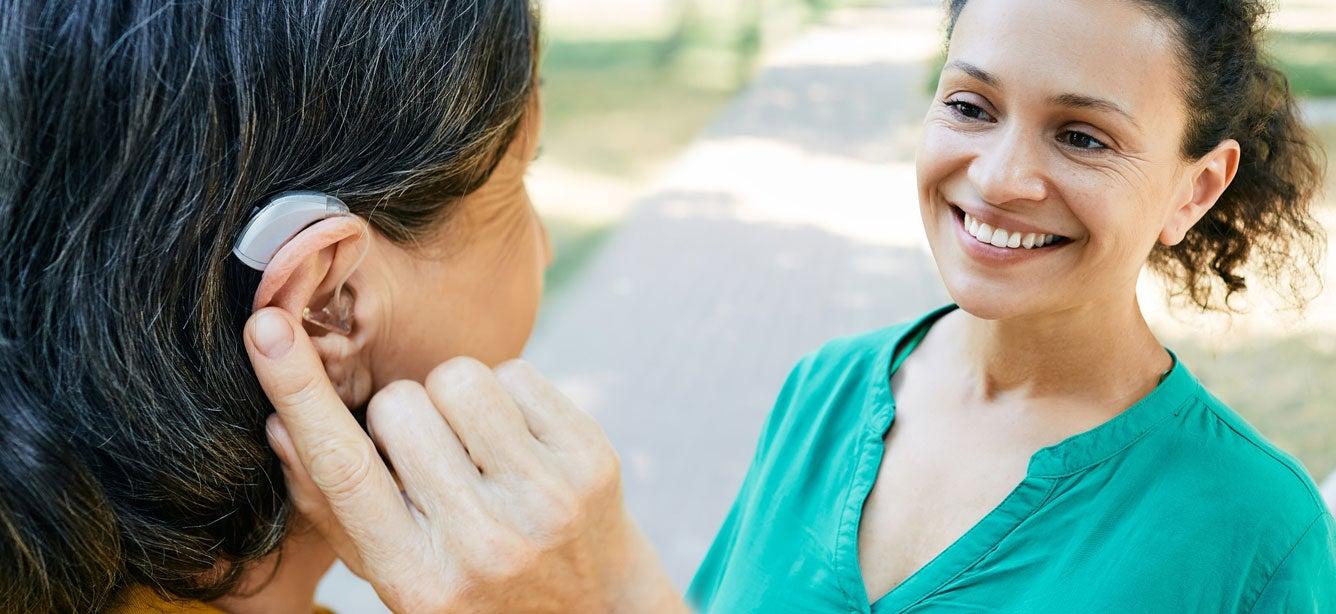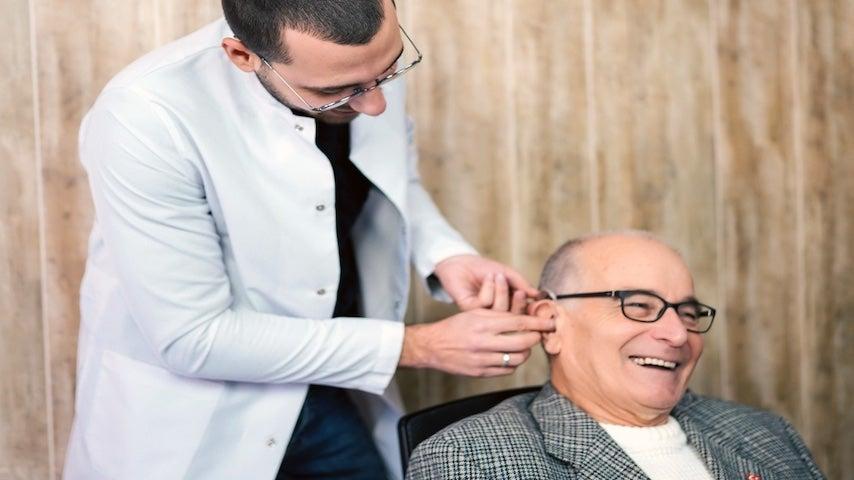
Related Topics
Hearing loss is a sudden or gradual decrease in how well you can hear and is one of the most common conditions affecting older adults. Approximately one in three people between the ages of 65 and 74 has hearing loss and nearly half of those older than 75 has difficulty hearing.
Hearing loss can impact all aspects of life, including making it hard to understand and follow a doctor's advice, respond to warnings, and hear doorbells and alarms. Hearing loss also makes it harder to participate in conversations with friends and family and enjoy entertainment like movies and concerts. This can be frustrating, embarrassing, and even dangerous. Hearing loss has also been associated with higher rates of depression and social isolation among older adults.
The good news is that the U.S. Food & Drug Administration (FDA) in October 2022 issued a rule for over-the-counter (OTC) hearing aids, an important step toward giving Americans more options for mild to moderate hearing loss. The FDA's rule is designed to help increase competition in the market while also ensuring the safety and effectiveness of OTC and prescription hearing aids.
Frequently Asked Questions
When were you able to buy over-the-counter hearing aids?
You can now buy hearing aids over the counter. Retail sales of OTC hearing aids began in October 2022 thanks to a federal ruling passed in August 2022 mandating more affordable options. OTC hearing aids do not require a visit to the audiologist or a prescription, making them much more accessible than traditional prescription hearing aids. Now is a good time to educate yourself on the types of hearing devices that are available and what might be right for your needs.
What are the three types of hearing devices?
- Sound amplifiers: One-size-fits-all devices, called PSAPs (personal sound amplification products), that are designed for recreational use for individuals with no hearing loss that simply make all environmental sounds louder. These are considered hearing “amplifiers,” not true hearing aids.
- Hearing aids: Medical devices for people with hearing loss, most frequently prescribed by a hearing health professional and customized to fit and adjusted to hear sounds in all listening situations. The hearing aids that will be sold OTC are for adults with only mild to moderate hearing loss and will be sold online and in stores without the assistance of a hearing care professional. The OTC hearing aids are different from prescription hearing aids for persons with more significant hearing loss that do require assistance from a hearing care professional.
- Implants: Cochlear implant solutions, or bone-anchored hearing systems, that are designed for those with severe-to-profound hearing loss.
What are the differences between OTC and prescription hearing aids?
Manufacturers will develop new products to be sold over-the-counter. Specifications about new features are being developed by the FDA. It’s important to be aware of the some differences to help you determine the best option for you.
Self-fit vs. Custom-fit. OTC hearing aids will be self-fitting and designed for adults with mild to moderate hearing loss. Without the support of a hearing care professional, the price is likely to be lower. While there may be some adjustable features, it will be up to you to determine your amount of hearing loss and to make any adjustments. For the first time user, the challenge with self-diagnosis could be that you won’t necessarily know what you’re missing. For instance, you may perceive the device is helping you hear “normally,” but normal for you may mean missing the full spectrum of sounds available. Prescription hearing aids are customized, meaning a hearing health professional will test and identify your level of hearing loss and customize your hearing aids to optimize your hearing.
Technology Differences. A broad range of features are offered on various hearing aids. As new products become available, you’ll want to check the features for the products you’re considering. For instance:
- Do you want rechargeable or replaceable batteries? Rechargeable batteries may be more expensive in the short term, but easier to use and less expensive over time.
- Do you want Bluetooth audio streaming? Streaming is helpful when talking on the phone, watching TV, etc.
- Do you want feedback control, volume control, a directional microphone? These features allow you some control over the device.
- Do you want a hearing aid that fits behind the ear or is placed in the ear? Behind the ear may be more comfortable; in the ear may be more appealing and easier to use.
- Do you want a telecoil? A telecoil allows you to connect to your telephone or a hearing loop, FM, or infrared system that provides direct audio input to sound in large-area listening situations, as required by the Americans with Disabilites Act (ADA). Listen to the difference these systems make.
One thing you do want to know: the trial period and return terms, no matter what type of device your purchase.
Price Differences. What are the price ranges for both OTC and prescription hearing aids? And what are the best hearing aids? OTC products are generally less expensive because they may offer fewer features and are be sold without the added services of a hearing professional. In contrast, hearing aids from a hearing professional can cost from $1,500 a pair and higher, depending on the technology, features, and the cost of services from the hearing care professional. Remember to check your insurance plan.
Does Medicare cover hearing assessments or hearing aids?
Today, traditional Medicare doesn’t cover hearing health, but some Medicare Advantage programs include a limited hearing benefit as do some federal and private health insurance plans. If you are a Veteran, check with the VA on the hearing benefits they provide. Several charitable foundations and other resources may be available to help you pay for hearing aids.
Like other technology you use daily, an upfront investment is required, so to demonstrate the true value, consider the cost per day over the life of the hearing aid, usually five years. For a few dollars a day, you can stay connected and engaged.
The investment on your hearing could even benefit your budget in the future since untreated hearing loss is associated with 46% higher total health care costs over a 10-year period.
How can I find help paying for hearing aids?
- Sertoma is a civic service organization that helps connect people with hearing assistance and offers a comprehensive listing of national and state charitable programs, organized by state.
- Help America Hear is an assistance program from the Foundation for Sight and Sound providing new hearing aids for low-income individuals.
- The Hearing Industries Association maintains a Guide to Financial Assistance for Hearing Aids. The association also recommends negotiating on the price of hearing aids.
- The Hearing Loss Association of America offers guidance on its Financial Assistance webpage.
- Some local Lions’ Clubs run projects which distribute affordable hearing aids to those in need. Contact your local chapter to see if it offers the program.
What's next for OTC hearing aids?
Stay informed as the FDA develops guidelines for OTC hearing aids. Consider the questions raised in this article. You may also wish to talk to your primary care physician and family and friends about your hearing loss and what options are best for you. NCOA will continue to provide updates as more information becomes available from the FDA over the next several months. Stay tuned!
Note: For more on over-the-counter hearing aids, read What Does the FDA Rule Mean for Older Adults?
Sources
1. The U.S. Food & Drug Administration's (FDA) news release, FDA Issues Landmark Proposal to Improve Access to Hearing Aid Technology for Millions of Americans, found on the internet at https://www.fda.gov/news-events/press-announcements/fda-issues-landmark-proposal-improve-access-hearing-aid-technology-millions-americans
2. The Hearing Industries Health Association, found on the internet at https://betterhearing.org/
3. The Hearing Loss Association of America, found on the internet at https://www.hearingloss.org/




